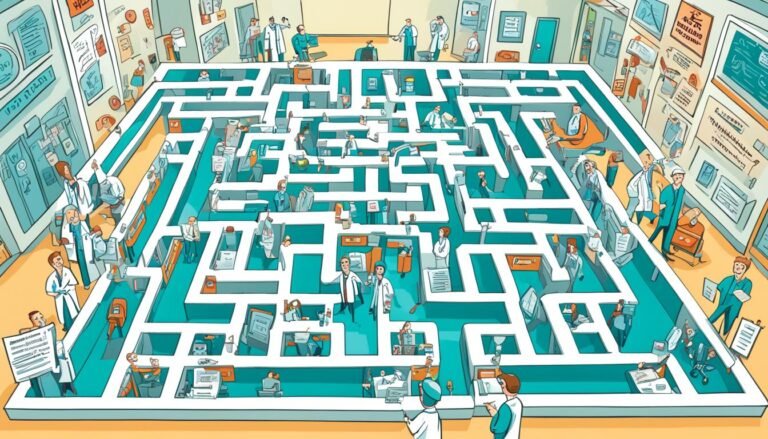Addressing Ethical Dilemmas in Clinical Settings
Ethics in healthcare is crucial. Healthcare professionals face many ethical dilemmas. They must make tough decisions while considering their patients’ well-being and ethical rules.
This article looks into the ethical dilemmas healthcare workers face. It discusses their strategies in handling these issues. We’ll talk about how they deal with sensitive information and meet legal and ethical disclosure rules.
Key Takeaways:
- Healthcare professionals face ethical dilemmas in clinical settings that require careful consideration and decision-making.
- Effective information management is crucial for providing quality patient care and maintaining ethical practices.
- Health professionals have legal and ethical obligations to disclose relevant information to patients.
- Nurse leaders play a vital role in addressing ethical challenges and promoting ethical nursing practice.
- Nurses encounter various ethical challenges in their practice and must prioritize patient well-being in their decision-making process.
Managing Ethical Challenges in the Clinical Context
Healthcare pros face many ethical challenges within their work. These happen with how information is handled, like keeping secrets, talking with others, doing your job, and making choices. It’s key for them to focus on what’s right for their patient while keeping things ethical.
Keeping patient info private is crucial and a main challenge. They must protect what patients share and who sees it. This involves safe medical records, strong data security, and limiting who can look at these records.
Good communication is also vital. Profs need to talk clearly with patients and family about health stuff. This helps patients understand their condition, treatment, and risks so they can decide well.
They also deal with tough duty dilemmas, like respecting freedom, giving top care, and honoring cultural rules. Meeting these needs involves using ethical rules, professional advice, and the patient’s own situation to choose what’s best.
Deciding what to do is a big part of handling these issues. They weigh up choices using ethical ideas and the four bioethics principles. This helps them make good choices that put the patient first.
“Ethical challenges in the clinical context require healthcare professionals to prioritize patient welfare, maintain confidentiality, communicate effectively, and make decisions that align with professional standards.”
Handling ethical issues rightly helps make health care better for all. Ways to do this include learning about ethics, working with others in the team, getting advice from ethics groups, and always thinking about how to make better choices.
Information Management Challenges
Info management also brings its challenges, like keeping data private and avoiding false info. Mistakes and leaks in privacy can spill secrets. It’s on health pros to protect this data, follow laws like HIPAA, and handle leaks fast.
Getting right info can be tricky too. Health pros must check sources carefully to decide on the best course. They look for the most accurate, relevant data, working closely to avoid any misleading info.
Dealing with these ethical issues takes a full-level effort. Handling data, talking well, doing your job right, and making good ethical calls are all part of the deal. By facing these problems head-on, health workers do better at respecting ethics, building trust with patients, and delivering top-notch care.
Strategies for Managing Ethical Challenges
Healthcare pros often deal with tough ethical issues. They need to use the right strategies to face these head-on. These strategies should fit the situation and understand the ethical problem deeply.
Resolution is one key strategy. It means solving a problem in a way that follows ethical rules and helps all involved. Balancing different values and interests is key to a fair solution.
Consultation is also important. This strategy suggests getting advice from others in the field. Talking to colleagues or supervisors can offer insights and new viewpoints. This can make the decision-making process more thorough.
Sometimes, it’s wise for healthcare workers to stall before deciding. This pause lets them gather more facts and think over the issue. It helps in making ethical choices that are well-thought-out.
Choosing whether to disclose or conceal info is another strategy. Disclosing means openly sharing details with everyone involved. Concealing is holding back information. But, the decision on disclosure should follow ethical rules and consider patient care and laws.
Every strategy has its ups and downs. The best choice depends on the problem. By using these methods carefully, healthcare workers can face ethical issues honorably. This leads to better patient care and ethical practice.
The Role of Information Management in Clinical Care
Effective information management is key to top-notch patient care in clinical settings. It is vital that healthcare workers manage and organize data with care. This ensures ethical practices and improves efficiency in clinics.
“Information management is the backbone of quality healthcare. It means gathering, storing, and using data to help make clinical decisions and boost patient outcomes.”
When healthcare workers handle information well, they build trust with their patients. Protecting patient data keeps trust and privacy strong. This is crucial for the health and satisfaction of those receiving care.
Bad information handling can harm the patient-worker relationship and outcomes. It might violate privacy, spread false info, or cause medical mistakes. It also makes teamwork harder in healthcare.
Benefits of Effective Information Management
Good information handling brings many perks to clinical care:
- It helps doctors and nurses make better choices faster. This can lead to better outcomes for patients.
- By reducing errors, it makes healthcare safer. Patients get the right meds and treatments, improving their health.
- It encourages teamwork among healthcare workers, making communication smoother. They can easily share important patient information.
Healthcare workers should focus on managing information well. With proper data handling, safe storage, and sharing, they can improve care. This leads to better health for patients.
Legal and Ethical Obligations in Information Disclosure
Health workers must follow certain rules when sharing info with patients. This is both to empower people to decide about their health and protect their freedom and health.
Within information disclosure, there are strict guidelines for healthcare workers. They must share info with patients respecting their right to choose. This includes telling patients about their illness, treatment options, and possible outcomes.
Healthcare professionals have to obey laws about what info they share with patients. This ensures health systems are open and honest. Not meeting these legal duties could lead to serious trouble like being sued or losing their job.
But, being honest with patients is also a top ethical rule. It supports the idea of doing good and not causing harm. By sharing information, healthcare workers help their patients make decisions about their own health.
Sometimes, even if it’s usual to share information, there are exceptions. For instance, if telling something could really hurt a patient, healthcare workers should think twice. In these cases, they have to balance the duty to inform with the potential harm of doing so.
It’s key for healthcare to focus on open communication. Health workers need to find a middle ground between their duty to talk and what’s best for the patient.
Additional Legal Obligations
Besides sharing info, health workers have other legal duties when it comes to their patients. These include:
- Ensuring patient privacy and confidentiality
- Obtaining informed consent before medical procedures
- Reporting instances of abuse or neglect
- Complying with documentation and record-keeping requirements
- Adhering to laws and regulations related to medical billing and insurance
The Ethical Imperative
“Being ethical is more than just following laws. It shows our dedication to focusing on patients and valuing their freedom and dignity.”
– Dr. Emily Thompson, bioethicist
| Legal Obligations in Information Disclosure | Ethical Obligations in Information Disclosure |
|---|---|
| Protect patient autonomy | Promote patient autonomy |
| Comply with laws and regulations | Uphold ethical principles |
| Prevent legal consequences | Foster trust and transparency |
| Ensure accountability | Prioritize patient well-being |
Ethics and Leadership in Nursing
Nurse managers have a big role in handling ethical matters in nursing. They lead in healthcare, showing how to practice ethics. They guide their teams to give top care to patients. Nurse managers lead by doing right themselves, encouraging ethical choices. This way, they keep up nursing ethics and promote leadership based on ethics.
Nursing ethics are a group of principles and values for nurses. They include respecting patients’ choices, doing good, not causing harm, staying true, being fair, and telling the truth. Nurse managers need to know these well and make sure their teams use them every day.
Also, nurse managers must follow the American Nurses Association Code of Ethics. This code highlights what nurses must do to be ethical. It focuses on patient care, keeping things private, and acting professionally.
By being ethical leaders, nurse managers make places for ethical nursing. They help keep communication open, push for talking about ethics, and offer support when there are ethical problems. Nurse managers lead their teams in putting patients first and following the best ethical practices.
“Ethical leaders have a big effect on the ethical environment in healthcare. They shape how their teams act and make choices, changing the care quality.”
Furthermore, ethical leadership in nursing isn’t just about individual patients. Nurse managers need to encourage the whole nursing staff to be ethical. This means making sure ethical thinking is in the organization’s rules and ways. They also stand up for patient rights, keep their info safe, and deal with ethical issues in healthcare places.
To wrap up, nurse managers are key in encouraging ethical nursing and living by ethical rules. Through their leadership, they set ethical standards and lead their teams to offer great patient care. Their focus on ethical leadership keeps nursing a trusted profession that cares a lot for patients.
Challenges Faced by Nurse Team Leaders in Ethical Decision-making
Nurse team leaders are key players in healthcare, leading and managing nursing teams. Alongside their roles, they tackle many ethical issues. These matters need wise decisions to ensure patients get the best care.
One big challenge is deciding in tough and complex situations. They must balance what’s best for patients, their team, and the hospital. For these decisions, they look at ethical principles like doing good, not causing harm, respect for autonomy, and fairness.
“As nurse team leaders, we face ethical dilemmas on a regular basis. It is our duty to ensure that ethical principles guide our decision-making and that we prioritize the well-being of our patients.”
They also face the struggle of meeting their duties with few resources. Healthcare is increasingly demanding, and there’s not always enough to go around. Leaders must make choices that benefit patients while managing resources wisely.
Dealing with ethical issues shows how important it is to have a plan. Talking with the team, getting advice from others, and consulting ethics experts can broaden their view. Also, staying up to date on ethics helps them handle dilemmas better.
Strategies for Overcoming Ethical Challenges
Here are some ways nurse leaders can tackle ethics issues:
- Talking to peers or mentors for advice can shed light on tough situations.
- Learning about ethical theories can help leaders understand and approach dilemmas better.
- Using ethical models for decisions, like “ethics of care,” can make the process clearer.
- Pushing for ethical policies and care that put patients first is crucial for leaders.
By using these methods, nurse leaders can handle ethical problems well. This way, they help create a work environment focused on ethical choices.
In their role, nurse leaders must be ready for ethical dilemmas. By taking on their duties fully and finding ethical solutions, they support top-notch care. This aligns with the high ethical standards of nursing.
Strategies for Nurse Team Leaders in Resolving Ethical Problems
Nurse team leaders are key in solving ethical dilemmas. They make sure care is both ethical and kind. They use good strategies to handle tough ethical situations on the job.
First, getting all the facts is important. This means knowing all about the ethical problem. It might involve checking medical records or talking to other healthcare workers.
Looking at the problem from a different angle can help. Nurse team leaders take a break to think deeply about the situation. This helps them see all sides clearly, leading to better decisions.
Quote: “Stepping back and gaining perspective is crucial in resolving ethical dilemmas. It allows nurse team leaders to consider the bigger picture and evaluate the potential impact of their decisions.” – Jane Smith, Nurse Team Leader
Also, having support from others is a great help. Talking to fellow healthcare workers can offer new insights. It also makes the decision process richer.
Lastly, nurses should always stand with their patients. Protecting their rights and well-being is top priority. This ensures ethical leadership and the best care for patients.
Implementation of Strategies: A Case Study
Imagine a busy hospital where a nurse has to choose about sharing patient info with family. The nurse gathers facts about the situation.
They then pause to think. They weigh the need for family info against the patient’s privacy. Consulting with others, they get advice from seasoned professionals.
In the end, the nurse chooses what’s best for the patient. They carefully balance ethical rules, ensuring the right decision is made.
| Strategy | Benefits |
|---|---|
| Seeking the facts | Allows for informed decision-making |
| Stepping back to gain perspective | Facilitates evaluation of different viewpoints |
| Considering support from colleagues | Offers valuable insights and guidance |
| Standing by patients | Prioritizes patient rights and well-being |
Using these strategies, nurse team leaders can deal with ethical issues well. This promotes ethical behavior among their teams. It’s vital for them to face ethical problems and keep the trust of the patients.
Ethical Issues and Leadership in Hospital Settings
Nurse administrators are key in hospitals, dealing with tough ethical issues and leading effectively. They must guide their teams through tricky moral challenges and set an example with ethical leadership.
It’s essential to deal with ethical issues in hospitals. Doing so helps keep healthcare high-quality and maintain patient trust. Nurse leaders work to ensure a workplace that cares for both patients and staff ethically.
“Ethics is knowing the difference between what you have a right to do and what is right to do.”
Nurse leaders show the way by following strict ethical rules. They encourage their teams to focus on ethical decisions and patient welfare. This means they support open talks, teamwork, and being professional at work.
To deal with ethical issues well, nurse leaders promote ongoing learning about ethics. They provide chances for their teams to learn and resources to help them handle ethical conundrums better.
Example Case Study:
Imagine this case showing why ethical leadership matters:
| Patient Confidentiality | Leadership Approach |
|---|---|
| A nurse administrator gets asked by a coworker to look at a patient’s records without reason or permission. | The nurse administrator, valuing patient privacy and ethics, shows the coworker the right way to access such info. They remind their team member about keeping patient information private. |
In this story, the nurse’s ethical leadership maintains patient privacy and trust in healthcare. They guide the colleague to handle sensitive information the right way. This protects the system’s integrity.
On the whole, nurse administrators are vital for handling ethical matters in hospitals. Their ethical leadership builds a workplace that values good choices and meets the highest patient care standards.
Ethical Challenges in Nursing Practice
Nursing comes with many ethical dilemmas. Nurses often face tough situations that test their ethical beliefs. This includes setting boundaries, keeping patient info private, and making hard choices about patient care.
“Ethics is knowing the difference between what you have a right to do and what is right to do.” – Potter Stewart
Boundaries with patients are key. Nurses should be professional yet caring. But things get tricky when personal connections or tough patient cases make these boundaries hard to set. In these times, nurses must focus on what’s best for the patient.
Keeping patient info private is very important. Nurses need to follow rules and keep personal details safe. They should only share this info with those who need it for patient’s care. This means respecting privacy laws and handling data with care.
Nurses often face tough choices between what a patient wants and what’s best for them. Letting patients decide is important, as is doing what’s right for their health. Balancing these needs can be hard. It means talking a lot with patients, including them in their care, and thinking through choices wisely.
Examples of Ethical Challenges in Nursing Practice:
- Determining when to disclose sensitive information to family members or caregivers
- Negotiating patient requests that may not align with evidence-based practice
- Informed consent and decision-making for patients with diminished mental capacity
- Managing conflicts of interest between patient care and institutional policies
Dealing with ethical issues starts with understanding key ethical beliefs. These include respect for patient’s decisions, doing what’s best for them, not causing harm, and fairness. By keeping these in mind and looking at each case carefully, nurses can choose what’s right for their patients.
| Ethical Challenges | Strategies for Resolution |
|---|---|
| Establishing boundaries with patients | Open communication, professional self-reflection, and seeking support from colleagues and supervisors |
| Safeguarding patient privacy | Adhering to laws and rules, respecting confidentiality, and using safe tech for info |
| Balancing autonomy and beneficence | Good talks, deciding together, teaching patients, and ethical thinking |
The Importance of Ethical Decision-making in Nursing
Ethical decision-making is crucial in nursing. It greatly affects patient care and the quality of care. Nurses often face ethical dilemmas needing correct choices for patient safety.
They use ethical principles, follow professional standards, and meet legal duties. This helps them through complex ethical issues. It ensures patient care is both ethical and effective.
Nurses must put their patient’s best interests first. It is important to recognize patient rights and autonomy. Ethical decisions balance what’s best for patients with the values of good and avoidance of harm.
By evaluating benefits and risks carefully, nurses choose what’s right. This fits with their ethical duties and responsibilities.
“Ethical decision-making in nursing involves considering various perspectives, analyzing available evidence, and reflecting on the potential consequences of different courses of action.”
Engaging in ethical decisions helps nurses enhance patient outcomes. They analyze data, work with teams, and reason ethically. This makes patient safety and well-being a top priority.
Such practices strengthen the bond between nurses and patients. It improves patient trust, crucial for the best care outcomes.
Benefits of Ethical Decision-making in Nursing
The benefits of ethical decision-making go beyond individual care. It improves the healthcare system. When nurses act ethically, standards for care rise.
Ethical choices build a culture of honesty and accountability in health. It encourages all healthcare workers to put ethics first.
It also aids in personal professional growth. By reflecting and reasoning, nurses improve decision-making and caring skills. This makes them stronger advocates in demanding situations.
Ethical decision-making is key in nursing. It ensures care that’s ethical and effective. By valuing ethics, nurses make a positive impact on their patient’s lives and the healthcare field.
Conclusion
Dealing with ethical issues in healthcare is tricky. It needs professionals to think deeply about the right thing to do. They must use good strategies and ethical rules to handle tough ethical cases. This helps them give proper care that is both ethical and effective.
Those in healthcare have a big job keeping patients safe and well. When stuck in ethical issues, they should think about values like autonomy and doing good. They should look at the plus and minuses of their choices, always choosing what’s best for their patients.
Adding ethical thinking to their work helps medical workers earn patient trust. It also makes care better and keeps the health system fair. Ethical ways guide them, making sure they do what’s right morally and professionally.
FAQ
What are some ethical challenges faced by healthcare professionals in clinical settings?
How can healthcare professionals address these ethical challenges?
What are some strategies for managing ethical challenges in clinical settings?
How does information management impact patient care in clinical settings?
What legal and ethical obligations do healthcare professionals have regarding information disclosure?
What role do nurse managers play in addressing ethical issues in nursing?
What challenges do nurse team leaders face in their role?
What strategies can nurse team leaders employ to resolve ethical problems?
What ethical issues do nurse administrators face in hospital settings?
What are some ethical challenges encountered by nurses in their practice?
Why is ethical decision-making important in nursing practice?
How can healthcare professionals address ethical dilemmas in clinical settings?
Source Links
- https://www.ncbi.nlm.nih.gov/pmc/articles/PMC10353582/
- https://www.ncbi.nlm.nih.gov/pmc/articles/PMC8023626/
- https://onlinenursing.duq.edu/blog/ethical-issues-in-nursing/

Our Healthcare Editorial Team is composed of subject matter experts and seasoned healthcare consultants who bring decades of combined experience and a wealth of academic qualifications. With advanced degrees and certifications in various medical and healthcare management fields, they are dedicated to supporting the personal and career development of healthcare professionals. Their expertise spans clinical practice, healthcare policy, patient advocacy, and public health, allowing us to offer insightful, well-researched content that enhances professional growth and informs practice.
Disclaimer
The client education section of our blog is intended to support healthcare providers by offering informational resources for patient education. However, this information is not meant to serve as medical advice. We advise healthcare professionals to ensure all content is consistent with their clinical knowledge and confirm with current medical standards before using it in their practice or advising patients. For specific medical issues, always refer to professional guidance and standards of care.
For any legal matters or specific medical concerns, we strongly recommend consulting with a qualified legal professional or referring to government websites for authoritative information.







